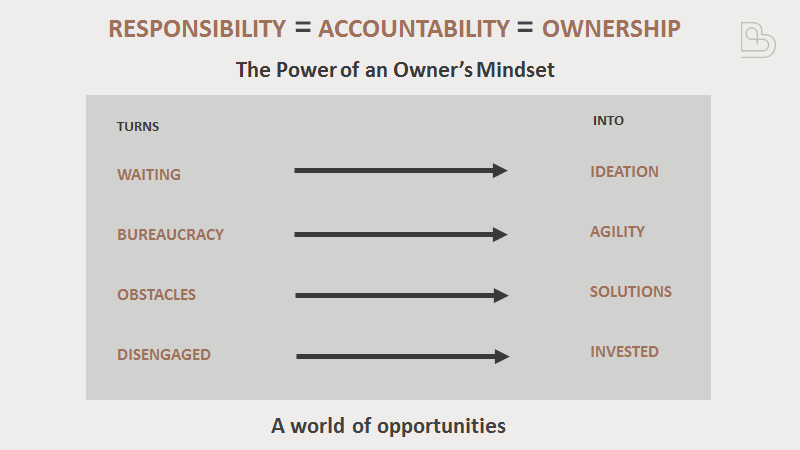6m
COVID-19: Finding the owner in all of us
- Written by Karen Tobiasen
- August 11, 2020
- Covid-19, Mindset
6m
“Responsibility equals accountability equals ownership. And a sense of ownership is the most powerful weapon a team or organization can have.”
— Patt Summitt, Award-winning basketball coach and author

Unemployment rates are sadly rising around the world as a result of the COVID-19 crisis. For many of us who have been able to remain with jobs, there’s been a refreshed level of gratitude for our work – 38% of respondents said they’re happier to have a job now than before the Corona period began.
It’s not just that it’s become clear to all of us that employment isn’t a guarantee – it’s also the understanding we all have, but didn’t previously consider much, that to have and keep a job our businesses must succeed. Just as we can’t take our own lives for granted, the mortality of business has also become so clear to us. We see shut down shops and restaurants on our walks every day, and news articles about companies going bankrupt.
Whereas before it may have felt natural to just show up to work every day, perform tasks dictated to us from leadership, and not really spend time thinking about the business’ long-term – we’re now more invested in the bigger considerations of the direction of the business, and how we can actively contribute and help it succeed.
We move from treating work as ‘just a job’, to realizing we have an active stake in the game, that we’re fortunate to be part of the organization, and have a desire to keep the business healthy and alive . In turn, that means we’re more inclined than ever to take on an owner’s mindset and search for opportunities in the challenges that COVID-19 has brought us.
So it seems our gratitude for our work may encourage an owner’s mindset in us, the question is:
What opportunities can we unlock for our organizations when we lean into an owner’s mindset?
When an organization starts operating with an owner’s mindset, many things become different …
- Ideation never ends – owners typically want to be better. The most innovative companies are constantly in an ideation stage. Employees People in the the company constantly asking, “How can I make our product or service better?”. Thinking like an owner means we ask big questions and look at how the market is evolving proactively, instead of waiting to react when we’ve already lost terrain. We ask; what do our customers and stakeholders want now and what will they want in a post-COVID, “next normal”?
- Aversion to bureaucracy—owners want to create value, fast. Layers of organization, lengthy chains of command, silos, complex processes, hefty decision-making forums clog the arteries of a business and slow it down. 94% of companies surveyed by Harvard Business Review say internal dysfunction—not lack of opportunity or unmatchable competitor capabilities—was the main barrier to their continued profitable growth. We see, however, how fast we’ve been able to maneuver during the Corona crisis – as we put our common purpose ahead of internal barriers. And so, while, as an employee, we may have felt powerless to impact “the way things are” – with an owner’s mindset, we dare to question and take control by continuing to act in new ways. How will we keep performing with the same speed and agility when this crisis passes?
- Bias to action – owners look for solutions, not obstacles. In business, we will always face challenges. We can choose to say, “that’s not my job/problem”, find excuses for reasons why things “can’t be done” – or we can choose to take control and solve it. We embrace the learning that we get from challenges, and even dare to try because we know that even if we fail, we can still decide to learn from it and make us better in the future. Is there anything you’ve delayed due to COVID-19 that you could actually be doing already now?
- Responsible decisions—owners think decisions through. Actions taken by an organization are seen as reflecting the owners’ values and beliefs. Expenses and investments would also be felt as an owner’s own money. So when we take an owner’s mindset, we make decisions that take the consequences into account – asking ourselves: ‘what would I do if it was my own company, my own money?’
- Go the extra mile – owners take extra initiative. When a business goes through a challenging time, we can choose to passively watch the situation, hoping it will blow over – or we can put in more effort to help the company through. Companies have had to cut their workforce down significantly as a result of COVID-19 and sent many more on furlough. The people remaining have had to take responsibility for continued business performance and meeting customer needs with less resources – and many attribute being able to find that resourcefulness by reminding themselves of their gratitude for still having a job. How will you continue to connect to the gratitude that drives you to go an extra mile also after the crisis?
The average CEO tenure for a public company is about 5 years. Instead of hinging your business on that one person – invite your entire organization to lean in and think of the organization as their own. Learn from mistakes together and celebrate together. Ownership is the first and foundational Transformational Capacity to build – because once you recognize that “it starts with me”, you know that you don’t have to wait for anyone else to take action or lead you. This mobilizes your whole organization to be resourceful and build up the resilience to thrive through times of change.
So whilst many are focusing on optimizing their supply chains and focusing on squeezing all possible waste out of processes and structures, maybe you can consider how in addition you can get one step ahead by also leaning into mindset. Because mindset can help you unlock capacity in your organization – and as we are seeing, gratitude is one of the ways to foster that and one that we can all connect to.
How will you continue to cultivate a culture of gratitude and ownership in your organization?
Save for later
AB InBev: a case for owner’s mindset
AB InBev is the largest and most profitable beer company in the world, with revenues of $50 billion, a market value of $186 billion, and a profit margin of 39%.
Not many people would’ve bet on AB InBev at its start, but the company has succeeded beyond expectations by cultivating the owner’s mindset as it has grown. It has constantly refined its practices and culture, embedding them into each new business acquired on the way, without ever changing its core repeatable model.
“We are a company of owners,” the company’s statement of principles reads. “Owners take results personally.”
Practices to reinforce an owner’s mindset:
- No offices, even for the CEO, because the leaders believed closed offices led to a culture of hiding and hierarchy
- Targets for every group, all the way to the CEO, were projected onto a big screen in the main office area, with their status. Everyone could see how others were doing, and how each piece connected to the whole
- Hiring focused heavily on people with a hunger to succeed
- Budgets were looked at from the ground up each year, and every cost mattered
A leader sums up the company’s approach: “We create restaurant owners, not waiters. If you’re a restaurant owner, and a new restaurant opens across the street serving the same food, how do you feel? You feel like someone is putting your livelihood at risk, threatening you, threatening your family. It’s personal, because the restaurant is your dream. But if you are a waiter, and a new restaurant opens across the street, how do you feel? At best, indifferent. Actually, there’s now competition for your services. Many companies inadvertently create waiters. We work tirelessly to create restaurant owners.”
Enroll today
Transformational Capacity is how you stay resourceful, relevant and resilient when facing change. It puts your transformation at the centre of your business transformation.
Are you ready for the future?
